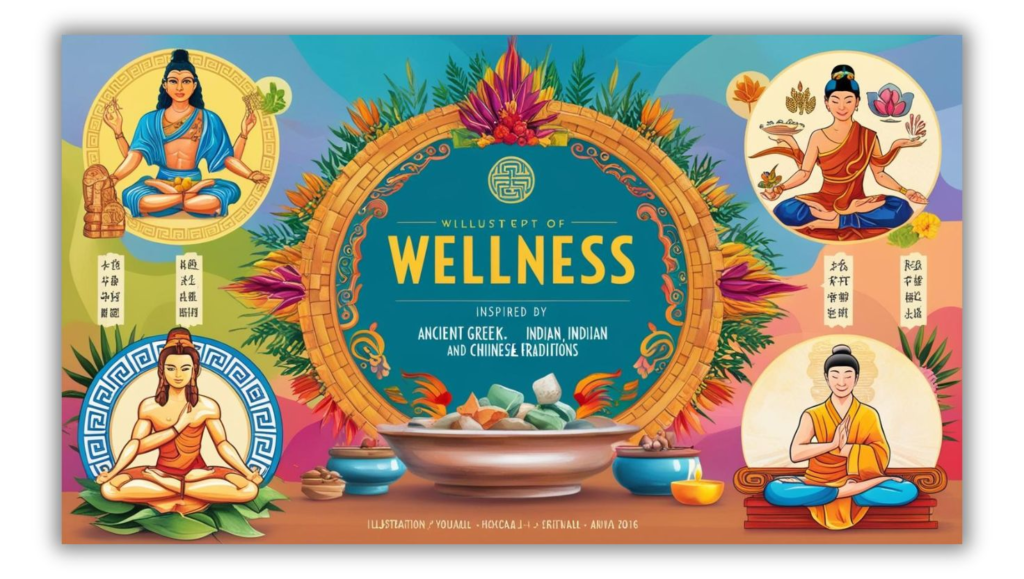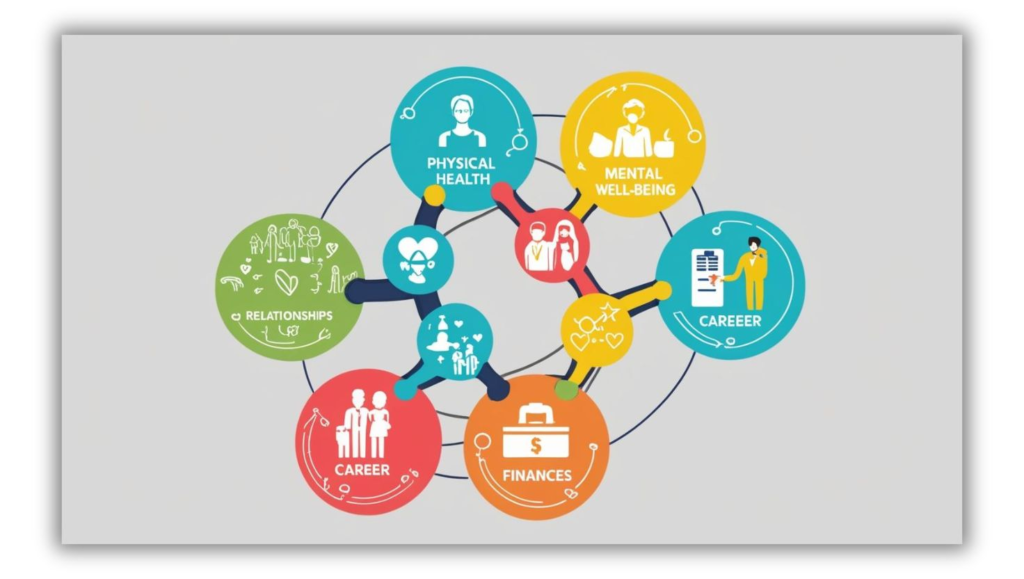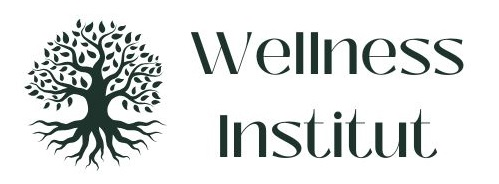What is Wellness?
Wellness is a holistic approach to health and well-being that goes beyond just the absence of illness. It focuses on the overall balance and harmony of a person’s physical, mental, emotional, and social health. Wellness involves making choices that enhance quality of life, and it’s about living in a way that supports optimal health and personal growth.
1. Where did wellness Start?
The concept of wellness has roots in various ancient traditions, but it began to gain significant attention in the Western world during the mid-20th century. Early ideas about wellness can be traced to ancient cultures such as those in Greece, India, and China, where holistic health was emphasized. The modern wellness movement, however, is often attributed to Dr. Halbert L. Dunn, an American public health expert, who coined the term “Wellness” in the 1950s. He proposed wellness as a dynamic process of change and growth, contrasting it with the more traditional concept of “health” as merely the absence of disease.

2. Who was the beginner of Wellness?
While the concept of wellness has ancient roots, Dr. Halbert L. Dunn is often credited with popularizing it in the modern era. He described wellness as the pursuit of optimal health and personal well-being, not just the avoidance of illness. Dunn’s work laid the foundation for the broader wellness movement that emerged in the 1960s and 1970s.

3. What does Wellness mean?
Wellness means striving for a state of complete well-being, where all aspects of life are balanced and functioning at their highest potential. It involves actively pursuing good health through positive lifestyle choices in areas such as nutrition, exercise, mental health, and emotional resilience. Wellness is an ongoing process of making conscious decisions to lead a fulfilling and healthy life.
4. Which areas in life does Wellness affect?
Wellness affects several key areas of life, including:
- Physical Health: Regular exercise, proper nutrition, sufficient sleep, and avoiding harmful habits like smoking or excessive drinking.
- Mental Health: Managing stress, cultivating a positive mindset, and practicing mindfulness and emotional regulation.
- Emotional Health: Building strong emotional intelligence, self-awareness, and coping mechanisms to handle life’s challenges.
- Social Health: Developing meaningful relationships, maintaining a supportive social network, and fostering a sense of community.
- Spiritual Health: Exploring personal values, connecting to a higher purpose, and finding peace or purpose in life.
- Environmental Health: Creating a healthy and supportive living and work environment that nurtures well-being.
- Occupational Wellness: Finding fulfillment and balance in your career or daily work life.
In essence, wellness encompasses a balanced approach to all aspects of life to ensure a sense of overall fulfillment and vitality.

5. Why is Wellness Important?
Wellness is important because it directly impacts your overall quality of life. It encourages a balanced, healthy approach to life, helping prevent illness, reducing stress, and promoting longevity. By focusing on wellness, you can optimize physical, emotional, mental, and social health, leading to a higher level of vitality and well-being. It also empowers individuals to take responsibility for their health, which can prevent chronic diseases and improve daily functioning.
What does wellness mean, and why is it important?
Wellness is a holistic approach to health and well-being that goes beyond just the absence of illness. It focuses on the overall balance and harmony of a person’s physical, mental, emotional, and social health. Wellness involves making choices that enhance quality of life, and it’s about living in a way that supports optimal health and personal growth. READ MORE
What are the 8 pillars of wellness and how do they support a balanced life?
The 8 pillars of wellness are not just aspects of life—they are dynamic stages where each individual interacts and in that interaction, gains different experiences, which assist in the individual`s personal growth, transformation, and deeper understanding – higher awareness. Each pillar represents a unique dynamic stage with different purposes and goals. Throughout the life, individual connects to all the 8 wellness pillars. In some stages of life more to ones, than to the others, because what is “very important” now to an individual, later on may change into something else. READ MORE
What does living a wellness way of life look like?
A wellness way of life is about embracing a balanced approach to health, nurturing both the body and mind (1st Wellness Pillar). It goes beyond just physical fitness; it includes emotional, mental, and spiritual well-being. READ MORE
What are the 3 minds and how do they influence my well-being?
Human behavior is guided by three fundamental aspects of our brain: the Reptilian Mind, the Emotional Mind, and the Logical Mind. Each of these minds develops at different stages of life and plays a crucial role in how we perceive and interact with the world. READ MORE
What are the first steps in starting a wellness journey?
Begin by evaluating your physical, mental, emotional, and social health. This includes reflecting on your habits, routines, stress levels, and how you feel overall. Identify areas where you’d like to improve. READ MORE
What is the Wellness Circle Club Community?
If you’re looking for a welcoming, supportive space to begin or continue your wellness journey, consider joining the Wellness Circle Club. This 5-level wellness program is completely free and designed to guide you through a structured yet flexible path to greater well-being. As you progress, you’ll receive a title at each level that represents your growth and accomplishments, starting from Wellness Explorer and advancing to Wellness Luminary. READ MORE
How have others transformed their lives through wellness practices?
Our stories share real-life experiences of people who have undergone significant changes in their physical, mental, emotional, and spiritual well-being by embracing various wellness approaches. Whether it’s through mindfulness, physical movement, nutrition, counseling, or holistic therapies, these stories offer insight into how people have faced and overcome challenges, improved their health, and transformed their lives. READ MORE
How can wellness improve my mental, emotional, and physical health?
The Main Benefits:
The main benefits of wellness include improved physical health, such as stronger immunity, better sleep, and increased energy, all of which contribute to a more vibrant and active lifestyle.
Wellness practices also enhance mental and emotional well-being by reducing stress, improving mood, boosting mental clarity, and fostering emotional resilience in the face of life’s challenges.
On a deeper level, wellness nurtures the soul by promoting inner peace, alignment with life’s purpose, emotional healing, and a stronger sense of connection to both oneself and the world around us. READ MORE
What wellness practices are important for different age groups?
Wellness is a lifelong journey, and the approach to it evolves with every stage of life. Each stage brings unique challenges, opportunities, and needs, and understanding how wellness practices can be adapted to these stages is key to maintaining overall well-being. Below, we’ll explore how wellness can be tailored to children, young adults, parents, and seniors, and how focusing on wellness at each stage can yield specific benefits. READ MORE
Where can I download the free ebook on how to start a wellness journey?
There is a couple of free eBooks and eWorkbooks available for Free Download. CLICK HERE
